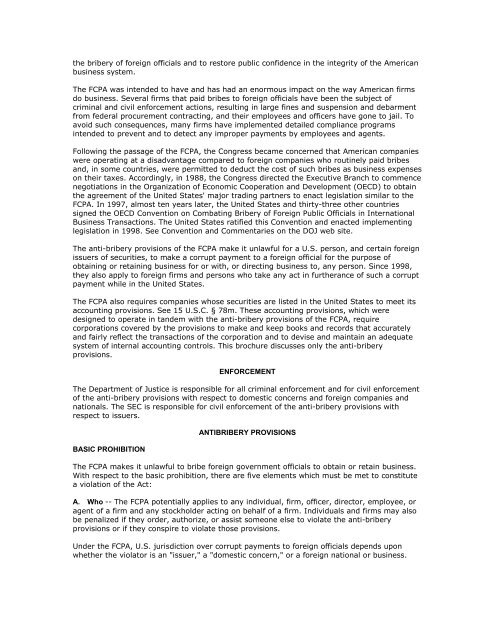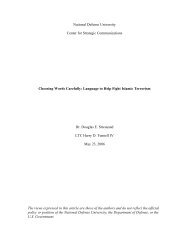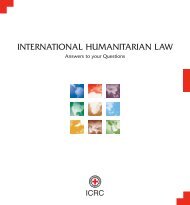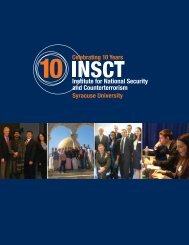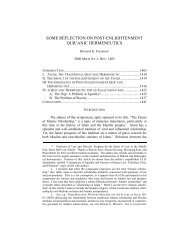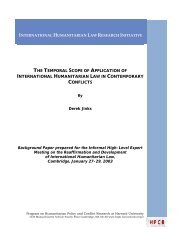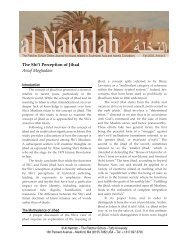<strong>the</strong> bribery of foreign officials and <strong>to</strong> res<strong>to</strong>re public confidence in <strong>the</strong> integrity of <strong>the</strong> Americanbusiness system.The <strong>FCPA</strong> was intended <strong>to</strong> have and has had an enormous impact on <strong>the</strong> way American firmsdo business. Several firms that paid bribes <strong>to</strong> foreign officials have been <strong>the</strong> subject ofcriminal and civil enforcement actions, resulting in large fines and suspension and debarmentfrom federal procurement contracting, and <strong>the</strong>ir employees and officers have gone <strong>to</strong> jail. Toavoid such consequences, many firms have implemented detailed compliance programsintended <strong>to</strong> prevent and <strong>to</strong> detect any improper payments by employees and agents.Following <strong>the</strong> passage of <strong>the</strong> <strong>FCPA</strong>, <strong>the</strong> Congress became concerned that American companieswere operating at a disadvantage compared <strong>to</strong> foreign companies who routinely paid bribesand, in some countries, were permitted <strong>to</strong> deduct <strong>the</strong> cost of such bribes as business expenseson <strong>the</strong>ir taxes. Accordingly, in 1988, <strong>the</strong> Congress directed <strong>the</strong> Executive Branch <strong>to</strong> commencenegotiations in <strong>the</strong> Organization of Economic Cooperation and Development (OECD) <strong>to</strong> obtain<strong>the</strong> agreement of <strong>the</strong> United States' major trading partners <strong>to</strong> enact legislation similar <strong>to</strong> <strong>the</strong><strong>FCPA</strong>. In 1997, almost ten years later, <strong>the</strong> United States and thirty-three o<strong>the</strong>r countriessigned <strong>the</strong> OECD Convention on Combating Bribery of Foreign Public Officials in InternationalBusiness Transactions. The United States ratified this Convention and enacted implementinglegislation in 1998. See Convention and Commentaries on <strong>the</strong> DOJ web site.The anti-bribery provisions of <strong>the</strong> <strong>FCPA</strong> make it unlawful for a U.S. person, and certain foreignissuers of securities, <strong>to</strong> make a corrupt payment <strong>to</strong> a foreign official for <strong>the</strong> purpose ofobtaining or retaining business for or with, or directing business <strong>to</strong>, any person. Since 1998,<strong>the</strong>y also apply <strong>to</strong> foreign firms and persons who take any act in fur<strong>the</strong>rance of such a corruptpayment while in <strong>the</strong> United States.The <strong>FCPA</strong> also requires companies whose securities are listed in <strong>the</strong> United States <strong>to</strong> meet itsaccounting provisions. See 15 U.S.C. § 78m. These accounting provisions, which weredesigned <strong>to</strong> operate in tandem with <strong>the</strong> anti-bribery provisions of <strong>the</strong> <strong>FCPA</strong>, requirecorporations covered by <strong>the</strong> provisions <strong>to</strong> make and keep books and records that accuratelyand fairly reflect <strong>the</strong> transactions of <strong>the</strong> corporation and <strong>to</strong> devise and maintain an adequatesystem of internal accounting controls. This brochure discusses only <strong>the</strong> anti-briberyprovisions.ENFORCEMENTThe Department of Justice is responsible for all criminal enforcement and for civil enforcemen<strong>to</strong>f <strong>the</strong> anti-bribery provisions with respect <strong>to</strong> domestic concerns and foreign companies andnationals. The SEC is responsible for civil enforcement of <strong>the</strong> anti-bribery provisions withrespect <strong>to</strong> issuers.BASIC PROHIBITIONANTIBRIBERY PROVISIONSThe <strong>FCPA</strong> makes it unlawful <strong>to</strong> bribe foreign government officials <strong>to</strong> obtain or retain business.With respect <strong>to</strong> <strong>the</strong> basic prohibition, <strong>the</strong>re are five elements which must be met <strong>to</strong> constitutea violation of <strong>the</strong> Act:A. Who -- The <strong>FCPA</strong> potentially applies <strong>to</strong> any individual, firm, officer, direc<strong>to</strong>r, employee, oragent of a firm and any s<strong>to</strong>ckholder acting on behalf of a firm. Individuals and firms may alsobe penalized if <strong>the</strong>y order, authorize, or assist someone else <strong>to</strong> violate <strong>the</strong> anti-briberyprovisions or if <strong>the</strong>y conspire <strong>to</strong> violate those provisions.Under <strong>the</strong> <strong>FCPA</strong>, U.S. jurisdiction over corrupt payments <strong>to</strong> foreign officials depends uponwhe<strong>the</strong>r <strong>the</strong> viola<strong>to</strong>r is an "issuer," a "domestic concern," or a foreign national or business.
An "issuer" is a corporation that has issued securities that have been registered in <strong>the</strong> UnitedStates or who is required <strong>to</strong> file periodic reports with <strong>the</strong> SEC. A "domestic concern" is anyindividual who is a citizen, national, or resident of <strong>the</strong> United States, or any corporation,partnership, association, joint-s<strong>to</strong>ck company, business trust, unincorporated organization, orsole proprie<strong>to</strong>rship which has its principal place of business in <strong>the</strong> United States, or which isorganized under <strong>the</strong> laws of a State of <strong>the</strong> United States, or a terri<strong>to</strong>ry, possession, orcommonwealth of <strong>the</strong> United States.Issuers and domestic concerns may be held liable under <strong>the</strong> <strong>FCPA</strong> under ei<strong>the</strong>r terri<strong>to</strong>rial ornationality jurisdiction principles. For acts taken within <strong>the</strong> terri<strong>to</strong>ry of <strong>the</strong> United States,issuers and domestic concerns are liable if <strong>the</strong>y take an act in fur<strong>the</strong>rance of a corruptpayment <strong>to</strong> a foreign official using <strong>the</strong> U.S. mails or o<strong>the</strong>r means or instrumentalities ofinterstate commerce. Such means or instrumentalities include telephone calls, facsimiletransmissions, wire transfers, and interstate or international travel. In addition, issuers anddomestic concerns may be held liable for any act in fur<strong>the</strong>rance of a corrupt payment takenoutside <strong>the</strong> United States. Thus, a U.S. company or national may be held liable for a corruptpayment authorized by employees or agents operating entirely outside <strong>the</strong> United States,using money from foreign bank accounts, and without any involvement by personnel locatedwithin <strong>the</strong> United States.Prior <strong>to</strong> 1998, foreign companies, with <strong>the</strong> exception of those who qualified as "issuers," andforeign nationals were not covered by <strong>the</strong> <strong>FCPA</strong>. The 1998 amendments expanded <strong>the</strong> <strong>FCPA</strong> <strong>to</strong>assert terri<strong>to</strong>rial jurisdiction over foreign companies and nationals. A foreign company orperson is now subject <strong>to</strong> <strong>the</strong> <strong>FCPA</strong> if it causes, directly or through agents, an act in fur<strong>the</strong>ranceof <strong>the</strong> corrupt payment <strong>to</strong> take place within <strong>the</strong> terri<strong>to</strong>ry of <strong>the</strong> United States. There is,however, no requirement that such act make use of <strong>the</strong> U.S. mails or o<strong>the</strong>r means orinstrumentalities of interstate commerce.Finally, U.S. parent corporations may be held liable for <strong>the</strong> acts of foreign subsidiaries where<strong>the</strong>y authorized, directed, or controlled <strong>the</strong> activity in question, as can U.S. citizens orresidents, <strong>the</strong>mselves "domestic concerns," who were employed by or acting on behalf of suchforeign-incorporated subsidiaries.B. Corrupt intent -- The person making or authorizing <strong>the</strong> payment must have a corruptintent, and <strong>the</strong> payment must be intended <strong>to</strong> induce <strong>the</strong> recipient <strong>to</strong> misuse his official position<strong>to</strong> direct business wrongfully <strong>to</strong> <strong>the</strong> payer or <strong>to</strong> any o<strong>the</strong>r person. You should note that <strong>the</strong><strong>FCPA</strong> does not require that a corrupt act succeed in its purpose. The offer or promise of acorrupt payment can constitute a violation of <strong>the</strong> statute. The <strong>FCPA</strong> prohibits any corruptpayment intended <strong>to</strong> influence any act or decision of a foreign official in his or her officialcapacity, <strong>to</strong> induce <strong>the</strong> official <strong>to</strong> do or omit <strong>to</strong> do any act in violation of his or her lawful duty,<strong>to</strong> obtain any improper advantage, or <strong>to</strong> induce a foreign official <strong>to</strong> use his or her influenceimproperly <strong>to</strong> affect or influence any act or decision.C. Payment -- The <strong>FCPA</strong> prohibits paying, offering, promising <strong>to</strong> pay (or authorizing <strong>to</strong> pay oroffer) money or anything of value.D. Recipient -- The prohibition extends only <strong>to</strong> corrupt payments <strong>to</strong> a foreign official, aforeign political party or party official, or any candidate for foreign political office. A "foreignofficial" means any officer or employee of a foreign government, a public internationalorganization, or any department or agency <strong>the</strong>reof, or any person acting in an official capacity.You should consider utilizing <strong>the</strong> Department of Justice's Foreign Corrupt Practices Act OpinionProcedure for particular questions as <strong>to</strong> <strong>the</strong> definition of a "foreign official," such as whe<strong>the</strong>r amember of a royal family, a member of a legislative body, or an official of a state-ownedbusiness enterprise would be considered a "foreign official."The <strong>FCPA</strong> applies <strong>to</strong> payments <strong>to</strong> any public official, regardless of rank or position. The <strong>FCPA</strong>focuses on <strong>the</strong> purpose of <strong>the</strong> payment instead of <strong>the</strong> particular duties of <strong>the</strong> official receiving<strong>the</strong> payment, offer, or promise of payment, and <strong>the</strong>re are exceptions <strong>to</strong> <strong>the</strong> anti-briberyprovision for "facilitating payments for routine governmental action" (see below).


